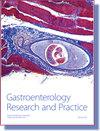Lipid Metabolism-Related Gene Signature Predicts Prognosis and Indicates Immune Microenvironment Infiltration in Advanced Gastric Cancer
IF 1.4
4区 医学
Q3 GASTROENTEROLOGY & HEPATOLOGY
引用次数: 0
Abstract
Objective. Abnormal lipid metabolism is known to influence the malignant behavior of gastric cancer. However, the underlying mechanism remains elusive. In this study, we comprehensively analyzed the biological significance of genes involved in lipid metabolism in advanced gastric cancer (AGC). Methods. We obtained gene expression profiles from The Cancer Genome Atlas (TCGA) database for early and advanced gastric cancer samples and performed differential expression analysis to identify specific lipid metabolism-related genes in AGC. We then used consensus cluster analysis to classify AGC patients into molecular subtypes based on lipid metabolism and constructed a diagnostic model using least absolute shrinkage and selection operator- (LASSO-) Cox regression analysis and Gene Set Enrichment Analysis (GSEA). We evaluated the discriminative ability and clinical significance of the model using the Kaplan-Meier (KM) curve, ROC curve, DCA curve, and nomogram. We also estimated immune levels based on immune microenvironment expression, immune checkpoints, and immune cell infiltration and obtained hub genes by weighted gene co-expression network analysis (WGCNA) of differential genes from the two molecular subtypes. Results. We identified 6 lipid metabolism genes that were associated with the prognosis of AGC and used consistent clustering to classify AGC patients into two subgroups with significantly different overall survival and immune microenvironment. Our risk model successfully classified patients in the training and validation sets into high-risk and low-risk groups. The high-risk score predicted poor prognosis and indicated low degree of immune infiltration. Subgroup analysis showed that the risk model was an independent predictor of prognosis in AGC. Furthermore, our results indicated that most chemotherapeutic agents are more effective for AGC patients in the low-risk group than in the high-risk group, and risk scores for AGC are strongly correlated with drug sensitivity. Finally, we performed qRT-PCR experiments to verify the relevant results. Conclusion. Our findings suggest that lipid metabolism-related genes play an important role in predicting the prognosis of AGC and regulating immune invasion. These results have important implications for the development of targeted therapies for AGC patients.与脂质代谢相关的基因特征可预测晚期胃癌的预后并指示免疫微环境渗透
目的。众所周知,脂质代谢异常会影响胃癌的恶性行为。然而,其内在机制仍不明确。本研究全面分析了晚期胃癌(AGC)中脂质代谢相关基因的生物学意义。研究方法我们从癌症基因组图谱(TCGA)数据库中获取了早期和晚期胃癌样本的基因表达谱,并进行了差异表达分析,以确定 AGC 中特定的脂质代谢相关基因。然后,我们使用共识聚类分析将 AGC 患者分为基于脂质代谢的分子亚型,并使用最小绝对收缩和选择算子(LASSO)Cox 回归分析和基因组富集分析(Gene Set Enrichment Analysis,GSEA)构建了诊断模型。我们使用 Kaplan-Meier (KM) 曲线、ROC 曲线、DCA 曲线和提名图评估了模型的鉴别能力和临床意义。我们还根据免疫微环境表达、免疫检查点和免疫细胞浸润估计了免疫水平,并通过对两种分子亚型的差异基因进行加权基因共表达网络分析(WGCNA)获得了枢纽基因。结果我们发现了6个与AGC预后相关的脂质代谢基因,并利用一致聚类将AGC患者分为两个亚组,这两个亚组的总生存期和免疫微环境存在显著差异。我们的风险模型成功地将训练集和验证集中的患者分为高风险组和低风险组。高风险评分预示着不良预后,并表明免疫浸润程度较低。亚组分析表明,风险模型是预测 AGC 预后的独立指标。此外,我们的研究结果表明,大多数化疗药物对低风险组的 AGC 患者比对高风险组的患者更有效,而且 AGC 的风险评分与药物敏感性密切相关。最后,我们进行了 qRT-PCR 实验来验证相关结果。结论我们的研究结果表明,脂质代谢相关基因在预测 AGC 的预后和调控免疫侵袭方面发挥着重要作用。这些结果对开发针对 AGC 患者的靶向疗法具有重要意义。
本文章由计算机程序翻译,如有差异,请以英文原文为准。
求助全文
约1分钟内获得全文
求助全文
来源期刊

Gastroenterology Research and Practice
GASTROENTEROLOGY & HEPATOLOGY-
CiteScore
4.40
自引率
0.00%
发文量
91
审稿时长
1 months
期刊介绍:
Gastroenterology Research and Practice is a peer-reviewed, Open Access journal which publishes original research articles, review articles and clinical studies based on all areas of gastroenterology, hepatology, pancreas and biliary, and related cancers. The journal welcomes submissions on the physiology, pathophysiology, etiology, diagnosis and therapy of gastrointestinal diseases. The aim of the journal is to provide cutting edge research related to the field of gastroenterology, as well as digestive diseases and disorders.
Topics of interest include:
Management of pancreatic diseases
Third space endoscopy
Endoscopic resection
Therapeutic endoscopy
Therapeutic endosonography.
 求助内容:
求助内容: 应助结果提醒方式:
应助结果提醒方式:


